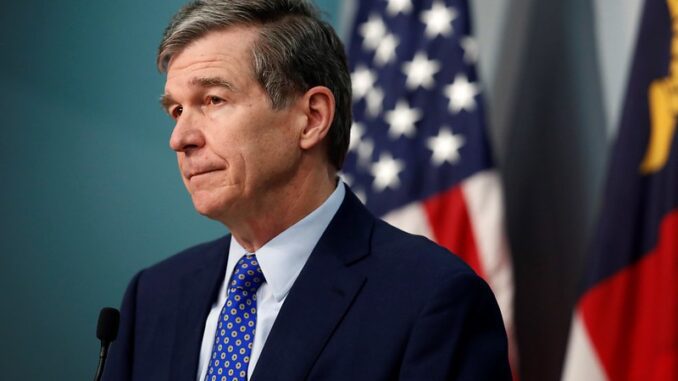
RALEIGH — In a press release on the signing and vetoing of the bills remaining on his desk on July 11, North Carolina Democratic Gov. Roy Cooper included a brief reference alluding to the end of his ongoing statewide COVID state of emergency order on Aug. 15.
“I’m glad it’s finally coming to an end and there are now safeguards in place to prevent a governor from having unlimited and unchecked emergency executive authority going forward,” Majority Leader John Bell (R-Wayne) told North State Journal in an emailed statement.
The statewide emergency order was issued March 10, 2020. If it is indeed rescinded on Aug. 15, it will be 888 days old or nearly two and a half years old.
“Gov. Cooper’s extended lockdown resulted in extreme learning loss for our students and crippled our small businesses,” Senate Leader Phil Berger (R-Eden) said in a statement to North State Journal. “The people of the state, especially our students who were forced out of their classrooms and are now months behind where they should be academically, were harmed. Yet, he doubled-down and kept his ‘emergency’ intact for 29 months. It’s past time to move on.”
The governor’s announcement comes on the heels of legislative leaders from both sides of the aisle publicly stating that it is past time for Cooper to end his COVID state of emergency.
“The budget includes the changes in the law requested by the N.C. Department of Health and Human Services to ensure flexibility that is currently made possible by the Governor’s Covid-19 State of Emergency,” Cooper said in the statement. “The State of Emergency will be lifted on August 15, 2022.”
Cooper’s remarks about changes in the budget related to the N.C. Department of Health and Human Services (NCDHHS) appears to be a reference to a letter sent by NCDHHS Secretary Kody Kinsley to House Speaker Tim Moore (R-Kings Mountain) in March of this year. During Cooper’s March COVID briefing, the governor passed the buck to lawmakers on ending his order and in his remarks alluded to the legislative wish list in Kinsley’s letter as the means to do so.
Kinsley’s letter was sent to Moore on the two-year anniversary of Cooper’s state of emergency. Kinsley claimed in his letter that the SOE “provides practical and necessary tools as we manage COVID-19” and “legislation needed for mitigation.”
North State Journal asked Cooper’s office to clarify his statement about the budget containing the changes requested by Kinsley and why he had chosen Aug. 15 as the end date. The governor’s office did not respond, but NCDHHS did.
Kelly Haight Connor, a Communications Manager for NCDHHS, wrote in an email that “Ending the state of emergency on Aug. 15 gives organizations a 30-day wind down period of those other flexibilities.”
In her email, Connor also listed “provisions in the budget” that are “related to preserving access to COVID-19 testing and treatments, preserving health care access and preventing a workforce shortage.”
Connor referred to allowing for “standing orders from the State Health Director for COVID-19 testing, vaccines and treatments through the end of 2023” and allowing NCDHHS to “waive rules for health care facilities and nursing homes so they can expand bed capacity (and mirror flexibilities offered by CMS).”
The 2022 Appropriations Act does include authorization for the state health director to “issue a statewide standing order to facilitate the administration of vaccinations, diagnostic tests, or other treatments for COVID-19.” This authorization was the first “mitigation” item in Kinsley’s March 2022 letter.
Two other provisions Haight pointed to which align with Kinsley’s March 2022 letter include allowing NCDHHS to “waive some rules so ambulances can continue to have one EMT and one licensed driver instead of two EMTs,” as well as permitting a “grace period for lead and asbestos inspectors to get re-certified, because it requires an in-person course which wasn’t offered during part of the pandemic.”
The 2022 Appropriations Act does include temporary waivers for certain rules as mentioned by Haight, but also those governing hospital bed capacity in the event of a state of emergency.
Over the course of the pandemic, Cooper consistently insisted the SOE was necessary to “draw down federal funds.” North State Journal could find no evidence to validate that claim and the governor’s office has not responded to requests for clarification.
During 2020, the legislature tried twice unsuccessfully to bring an end to Cooper’s long-running COVID emergency.
Lawmakers passed Senate Bill 105, the Emergency Management Act, in July 2021 which directed the governor to obtain concurrence from the Council of State on emergency orders. Cooper promptly vetoed the bill. In his veto message claimed that requiring concurrence would place “additional bureaucratic and administrative obligations on the declaration of a state of emergency.” An override of the veto failed in the Senate down party lines by a vote of 26-21.
In October 2021, the General Assembly passed another bill to rein in the emergency powers of the governor as Cooper’s state of emergency order passed the 600-day mark. House Bill 264, the Emergency Powers Act, would have required the governor to obtain concurrence from the Council of State 48 hours prior to issuance of a statewide emergency or imminent hazard declaration. All documentation pertaining to the request for concurrence would have been considered public records.
House Bill 264 was passed and sent to Cooper on Oct. 22, 2021, which he then vetoed on Nov. 1. The bill remains active and the veto could be revisited at a later date after it was referred to the Committee on Rules, Calendar, and Operations of the House on Nov. 2, 2021.
The legislature was finally successful with the inclusion of language on emergency powers in the 2021 budget, which Cooper signed.
The 2021 budget, contained in Senate Bill 105, included a provision barring an ongoing state of emergency declaration lasting beyond 30 days unless concurrence is received from the Council of State. If concurrence is received, at the 60-day mark the state of emergency would expire unless the General Assembly acts. The provision goes into effect Jan. 1, 2023.



